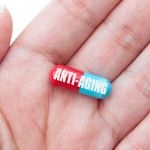By David Blyweiss, M.D.
In these tough economic times, I hear a lot about healthcare. But no matter what your opinion on the new healthcare laws, the truth is that modern medicine still focuses on disease instead of wellness. In my opinion, that’s simply the wrong approach!
If you want to save on health care and sidestep the red tape so prevalent in the insurance industry, look to prevention. After all, fighting cancer, heart disease and diabetes can cost you thousands of dollars yearly in medication, doctor visits and treatment. But it’s a lot cheaper to keep from getting sick in the first place.
Open your arteries, improve blood flow for a new health miracle...
Did you know your circulatory system has over 60,000 miles of arteries, veins and other blood vessels, if stretched end to end?
But as you age, your blood vessels undergo changes, which may cause them to stiffen, thicken and get clogged.
GOOD NEWS! Doctors have now identified a “Miracle Molecule” inside your arteries that helps OPEN your arteries and IMPROVE blood flow.
It’s what Dr. Valentin Fuster calls it, "One of the most important discoveries in the history of cardiovascular medicine."To you, that means...
- Healthy blood pressure
- Sharper mind and memory
- Skyrocketing energy and muscular strength
- Increased pleasure and passion in the bedroom
- Improved circulation to every cell and organ in your body
Go here to discover a new natural way to significantly boost the levels of this miracle molecule in YOUR body NOW!
Along with eating a healthy diet and getting plenty of exercise, here are my top 5 supplements for staying healthy:
Are You Suffering From...
- Love handles and a pot belly
- Romance that isn't what it used to
- Forgetfulness and inattention
- Low (or no) strength and endurance
- A sex drive that's shifted into neutral...or worse
If so...you may have Mature Male Burnout. Click here to discover more about this unique condition and what you can do about it.
Multivitamin. It’s virtually impossible to get all of the vitamins and minerals you need through diet alone. Taking a multi every day can help fill in any nutritional gaps and provide extra antioxidant support. A multi also helps you body convert the food you eat into better, more stable energy. What’s more, a new study in the American Journal of Clinical Nutrition has found a link between multivitamins and a lower risk of heart attack in women.1 Look for a whole foods multivitamin and take one daily with food.
Curcumin. One of the most prevalent problems I see in my practice is chronic inflammation. It shows up in patients as cardiovascular disease, cancer and Alzheimer’s disease. Modern life and the standard American diet just keep this inflammation simmering away. But you can tamp down inflammation with Curcumin. Derived from the curry spice, tumeric, Curcumin is a potent anti-inflammatory that acts as a scavenger of nitric oxide and inhibits COX-2, a pro-inflammatory substance, better than pharmaceuticals! It also helps ease arthritis pain. There’s only one catch—the body has trouble absorbing curcumin so look for a curcumin supplement that includes piperine from black pepper to boost absorption. Take 750 mg. of curcumin and 2–5 mg. of piperine every day.
Fish Oil. Taking 3,000 mg. of fish oil daily can lower your triglyceride levels and cut the risk of suffering a stroke in half. The reason is that fish oil reduces stickiness in the blood and prevents dangerous clots from forming. As an extra benefit, fish oil also improves mood, supports healthy skin and joints, enhances brain function and reduces inflammation. But fish oil may offer even more benefits. A recent study found that people with the highest blood levels of omega-3s—the type of fat found in fish oil— had the least chromosome damage, a marker for aging and age-related disease.2
Vitamin D. If you’ve been keeping up with the news lately, it may seem like vitamin D can do just about anything. It prevents some types of cancer and enhances bone health. Research also suggests that it supports healthy blood pressure and protects against depression. It also strengthens the immune system.3 The problem is, many Americans are woefully deficient in this critical nutrient. You an easily remedy this, however, by taking a minimum of 1,000 IU of D daily. Just be aware that vitamin D is fat soluble so make sure to take it with a meal containing some fat for best absorption.
Probiotics. The best way to support digestive health is by stocking your gut with beneficial bacteria. But taking a probiotic supplement every day doesn’t just improve digestion. It also supports healthy cholesterol levels, enhances immunity and boosts the absorption of the nutrients in food. These beneficial bugs are sold as powders, liquid, capsules and tablets—many of which need to be refrigerated. The minimum dose to prevent common illnesses is one billion live organisms a day. While that might sound like a lot, it’s actually about the same amount you’ll find in a cup of yogurt. But when it comes to probiotics, more is better. In fact, it isn’t uncommon to take two to six billion organisms per day in divided doses.
These 5 supplements can provide a great foundation, no matter what the current state of your health—and all for just pennies a day. In my book, that’s one of the best investments you can make.
References:
1. Rautiainen S. Multivitamin use and the risk of myocardial infarction: a population-based cohort of Swedish women. American Journal of Clinical Nutrition. September 22, 2010. Published online ahead of print.
2. Farzaneh-Far R. Association of marine omega-3 fatty acid levels with telomeric aging in patients with coronary heart disease. Journal of the American Medical Association. 2010;303:250-257.
3. Buhr G. Nutritional supplements for older adults: review and recommendations–Part I. Journal of Nutrition for the Elderly. 2009;28:5-29






